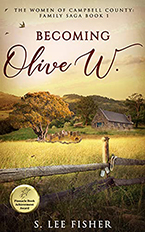March 25, 2022
Becoming Olive W.
The Women of Campbell County: Family Saga Book 1
S. Lee Fisher
RNS Publishing (2021)
ISBN: 978-1-7367526-0-9 (paperback)
ISBN: 978-1-7367526-1-6 (ebook)
Novel with Strong Female Protagonist Wins Tyler R. Tichelaar Award for Best Historical Fiction
 S. Lee Fisher’s new novel Becoming Olive W. has won the Tyler R. Tichelaar Award for Best Historical Fiction in this year’s Reader Views Literary Awards. This first volume in Fisher’s The Women of Campbell County series is winning fans everywhere. In addition, it won Best Book in the Women’s Interest Category in the NABE Pinnacle Book Achievement Awards, was a Finalist in the NIEA Indie Excellence Book Awards Women’s Fiction category, received the Gold Award in the Literary Titan Book Awards, earned the Bronze in both the CIPA EVVY Awards and Reader’s Favorite Book Awards, and was a finalist in the American Fiction Awards.
S. Lee Fisher’s new novel Becoming Olive W. has won the Tyler R. Tichelaar Award for Best Historical Fiction in this year’s Reader Views Literary Awards. This first volume in Fisher’s The Women of Campbell County series is winning fans everywhere. In addition, it won Best Book in the Women’s Interest Category in the NABE Pinnacle Book Achievement Awards, was a Finalist in the NIEA Indie Excellence Book Awards Women’s Fiction category, received the Gold Award in the Literary Titan Book Awards, earned the Bronze in both the CIPA EVVY Awards and Reader’s Favorite Book Awards, and was a finalist in the American Fiction Awards.
What is the secret to Becoming Olive W.’s success? Besides its accurate recreation of American farm life in Pennsylvania in the years 1905-1919, at its center is the unforgettable character, Olive Westchester. Olive is only a toddler when the novel begins, but she matures early, both in brains and looks and has a beau interested in her just before she reaches her teen years. But Olive’s physical beauty is nothing compared to her spunk. Since she is an adolescent during much of the novel, perhaps the most appropriate character from literature to compare her to is Anne Shirley of Green Gables fame; Olive is just as smart as Anne, but not as overly imaginative or loveable. Fisher allows no sentimentality to creep into this tale but rather shows the hardships women faced at the time. Olive quickly learns she must survive in a man’s world, a world where most of the boys and men, as well as the females, prove themselves to be not only inferior to her, but also often rude and cruel. Olive must repeatedly speak her mind to avoid being overlooked or discounted, and if others don’t like her as a result, she could not care less.
Fisher has created a character right out of the annals of American history, a character who must adapt to the times she lives in even if she is far ahead of them. With a mother who died before she was old enough to remember her, and a brood of older siblings, many with small children of their own, Olive is often left to fend for herself. She begins to observe the world, and especially the farm around her, and see what it is like to be a woman without power. She quickly decides to do something about that by getting an education. Her father admires her strong will, business savvy, and math skills, so while still a child, Olive takes over his bookkeeping. Before long, however, Olive expresses a desire to go to high school and college. When her father tells her she will, instead, attend finishing school and find a husband, the fight is on. Olive soon learns her father is underpaying her for doing the bookkeeping and demands higher wages. She also refuses to give up on her goals. As World War I arrives, Olive has to cope with her favorite brother going off to fight and realizing that if she doesn’t act soon, it will be too late to fulfill her dreams.
As I read Becoming Olive W., I couldn’t help being reminded of other classic American novels in which female characters take over family businesses when the men around them are less capable. Olive Westchester can easily hold her own beside Alexandra Bergson of Willa Cather’s O Pioneers! and Selina Peak of Edna Ferber’s So Big. She could even compete with Scarlett O’Hara for stubbornness and gumption. But Olive also deserves love, respect, recognition, and compassion—all seemingly impossible for her to gain as she tries to survive in her large and often dysfunctional family. I hope she will eventually find them.
The novel ends with a cliffhanger that will have readers quickly turning to the second book in the series, Under the Grapevine. The third book, Hill House Divided, which was just published, will be followed by a fourth in the near future. Together they promise to tell the rest of Olive’s story and that of the other women in her family throughout the twentieth century.
Fisher’s novel is Americana at its finest devoid of sentimentality and flag-waving. It offers a realistic treatment of what a young, intelligent woman growing up in early twentieth century America would have faced in a time before women could even vote. I imagine Olive’s story is far from over, and her literary legacy has only just begun.
For more information about S. Lee Fisher and Becoming Olive W., visit www.SLeeFisher.com.
— Tyler R. Tichelaar, PhD and award-winning author of Narrow Lives and When Teddy Came to Town

